The Witcher 3: Wild Hunt finally made its retail debut last week, giving us all something to obsess over from now until the holiday season. Maybe even longer than that. But the real surprise, for most of the Witcher 3 community, has been the Gwent mini-game introduced in The Witcher 3: Wild Hunt.
For some, Gwent may be the first card game they've spent any serious time with in several years. Others will just be trying to figure out how they can adapt their preferred Magic or Hearthstone strategy to The Witcher 3: Wild Hunt's surprisingly addictive card game. Fortunately, we’ve got some advice for anyone still struggling to wrap their brains around Gwent and looking to complete the various Gwent quests featured in The Witcher 3: Wild Hunt.
Obviously, there’s more to mastering Gwent than these tips. But this should get you started on the path to being the Continent’s next Gwent champion.
1. Stop Worrying About Round One
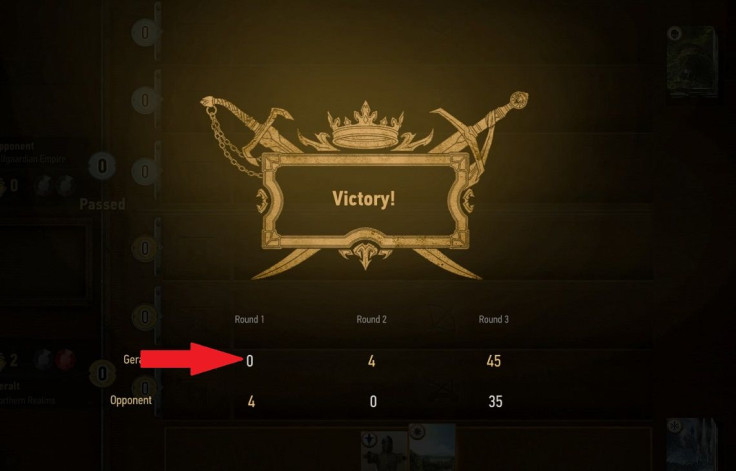
It’s easy to get caught up in taking the first round, since you have to win two per game, but we’ve found more significantly more success by slow-playing our opponents. In fact, we’d say it’s vital to remember that winning the first round isn’t what’s important in Gwent. It’s how you play the opening exchange.
If you’ve got a few decent draw cards in your hand, load up your opponent’s side of the field, take a pass and then celebrate any unnecessary plays they make. It’s pretty easy to get card advantage over your opponent, forcing them to divide their hand between two more rounds and giving yourself a significant tactical advantage in the process.
2. Play Spies Early
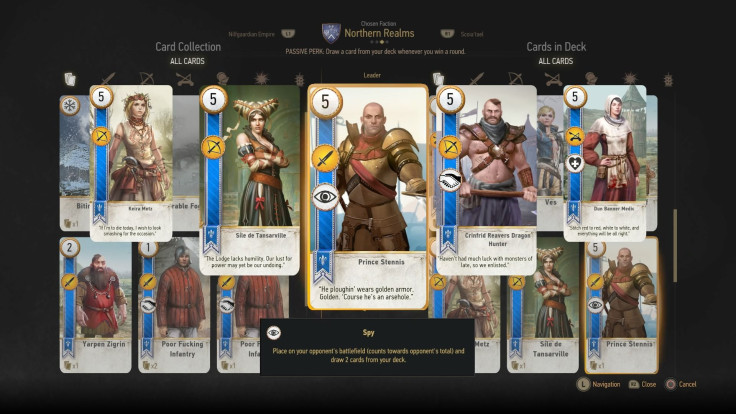
At a glance, giving your opponent points/units might not seem like a great idea. But once you realize the first match isn't important, it’s much easier to get the full value of the Northern deck’s draw cards. And there are plenty of them to make use of.
Cards like Prince Stennis and Sigismunt Dijkstra can be purchased from the merchants and innkeepers spread throughout the Continent. Buy them as soon as you can locate/afford them and use them to replace the weaker cards from Geralt’s starter set. Just hope that you draw them early.
3. Always Decoy Enemy Spies

Of course, you might not be fortunate enough to have a Spy in your starting hand. That doesn’t mean you can’t still finesse your way to an extra card or two. Keeping a couple of Decoy cards in your deck ensures that any spies from the opposing side of the battlefield can be repurposed for your own gains.
One Decoy card can be purchased from the Quartermaster in Crow’s Perch, which should come in handy when you decided to challenge the Bloody Baron.
4. Pay Attention To Hero Powers And Card Attributes
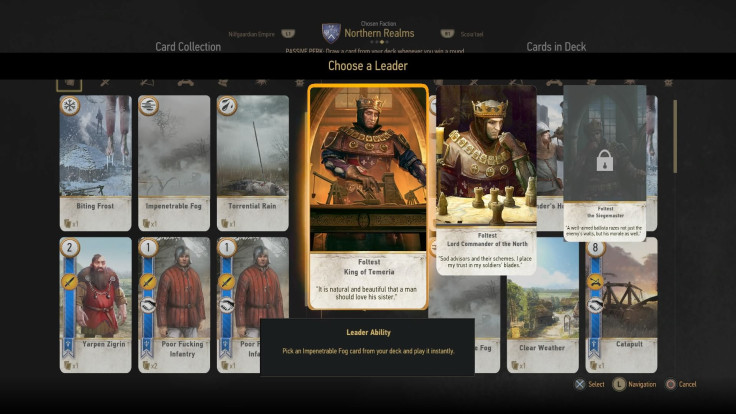
Some of the game's best cards are heroes that ignore debuffs from other cards, making them difficult to counter in a game that doesn't feature direct card removal. Sure, Scorched will still destroy your hero card(s) if they’re sitting in the most-valuable lane. But that’s one removal card in a set that includes 149 other units and special cards.
This can also be important early in the game. Players running Northern decks shouldn’t hesitate to swap out Impenetrable Fog if it appears in their opening hand, provided they’re still using King of Temeria as their leader. That’s because the King grants the ability to pull (and play) an Impenetrable Fog from your deck one time during the match. The same goes for Clear Weather and Lord Commander.
5. Look For Value Plays
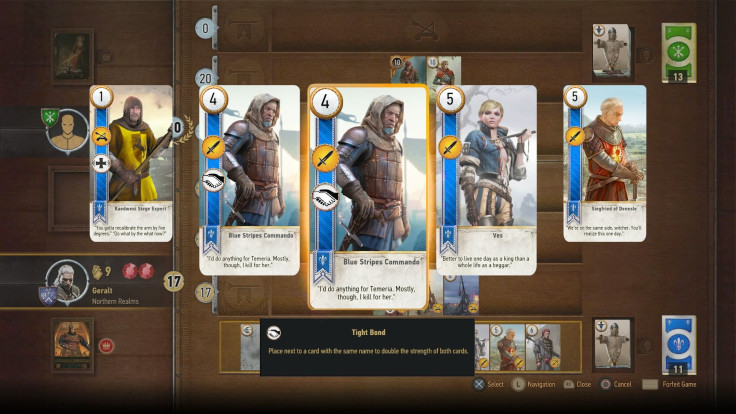
Units that let you draw more cards aren’t the only ones to watch out for in Gwent. There are a handful of card attributes that seem to be the clear favorites in Gwent, including Swarm and Tight Bond. There’s also Medic, which lets you bring one unit back from the graveyard (including spies!) and immediately add it to the battlefield. But the first two can really elevate players’ average round score.
Until you get enough cards to build one of the other decks, focus on getting enough Blue Stripes Commandos and/or Crinfrid Reaver’s Dragon Hunters to be able to reliably win at least one round with less than five unit cards. It won’t always be necessary but you’ll be glad you planned ahead on those rare occasions when it’s needed.
6. Don't Use More Than 22 Unit Cards
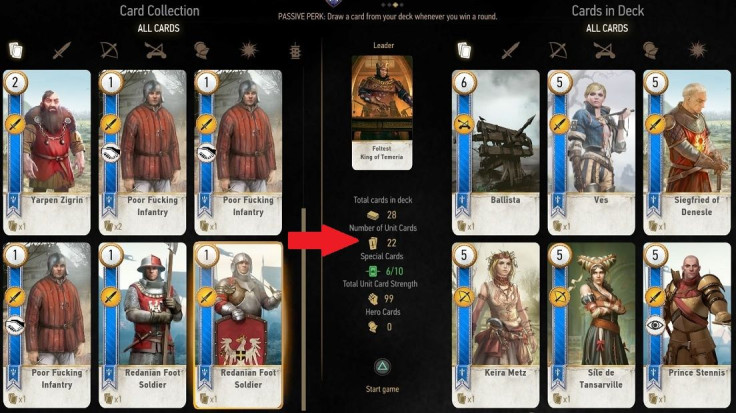
The rules of Gwent require you to keep at least 22 unit cards in your deck. But there’s not much reason to field any extras. Even the game’s best combinations still leave plenty of room for The Witcher 3: Wild Hunt players to stick with Gwent’s minimum unit requirement.
The idea is to have only your best units in your Gwent deck, with as little separating you from your top cards as possible. It’s a principle that should be familiar to fans of just about any other card game on the planet. But those coming to CCGs, even mini-game versions, might need that small nudge to reduce the size of their favorite deck(s).
7. You Don’t Need 10 Special Cards
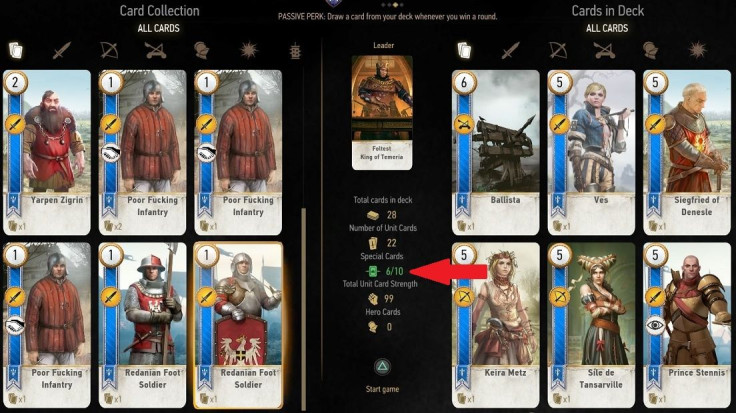
It can be tempting to load your deck up with weather changes, and other special cards, in an attempt to neutralize any unit your opponent plays. But it’s easy to find yourself with a too many special cards in your hand and too few units to claim the final round in a Gwent game that goes the distance.
Yes, you’ll probably need a few Special Cards to complement your Gwent deck of choice, particularly as you work your way through the Gwent quest chains. But you shouldn’t need to the maximum number of special cards to takedown many of Geralt’s early Gwent opponents.
8. Know What To Expect From Each Deck
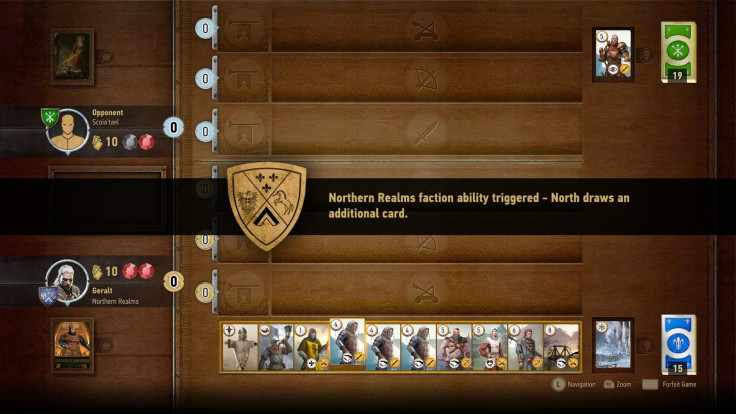
Building a great deck is only half of the Gwent battle. Knowing what to expect from your opponent, and the various strategies that can be used to win with each deck, will frequently be the difference between adding a new Win and a new Loss to your record.
The Northern deck is a good starter pack, mixing a few special cards with units that can be combined , and winning a round with it entitles the user to an extra card for their hand. Scoia'tael players always get to go first, which can come in handy for controlling momentum, and those using the Nilfgaardian deck take the W in the event of a draw. The Monster deck is basically designed to belch creatures onto the battlefield until the opponent simply can't keep up with your units' Swarm ability.
9. Wagers Don’t Effect Card Prizes

This one’s pretty simple. While it’s easy to use Gwent for extra income, especially once the bet ceiling begins to rise, you should probably make sure you can beat the person you’re challenging before betting the most that The Witcher 3: Wild Hunt will allow.
And don’t let the desire to continue growing your selection dissuade you from betting light at first. As long as it’s your first time playing an opponent you’ll be given a new card for winning. So play it safe during your first match and go back for the big bucks once you’re certain your Gwent deck is superior.
10. Buy Cards Every Chance You Get
Anytime someone offers to play you at Gwent, beating them will yield a new card for your collection. But you’re still going to need to do some shopping to hunt down all of the Gwent cards available in The Witcher 3: Wild Hunt at launch.
Most of the game's vendors will only offer a couple of cards. Some won’t have any. But traders stock Gwent cards frequently enough to make it worth checking, even when you weren't planning to stop for repairs and/or to sell off extra valuables. Before long, finding vendors with three to five Gwent cards will feel like its own reward and you’ll see each town as the next step on your path to the Card Collector achievement.
If there’s anything we’ve learned from Hearthstone, it’s that balance tweaks can shift the meta at any time, forcing players to adopt new strategies as the game evolves. The same will likely be the case for Gwent, as new cards are introduced in upcoming expansions. The descriptions for the game’s Gwent achievements, which ask players to complete tasks based on the “base set”, even suggest new cards will be coming sooner or later.
So buy/win every card you can get your hands on. You never know what Gwent cards will be on the Most Wanted list next.
***
Be sure to check back with iDigitalTimes.com and follow Scott on Twitter for additional The Witcher 3: Wild Hunt coverage throughout the remainder of 2015 and for however long CD Projekt Red continues to support The Witcher 3: Wild Hunt with new content in the months ahead.
What do you think of The Witcher 3: Wild Hunt’s attention-grabbing mini-game? Want to share some tips of your own with the Witcher 3 community? Want to solicit input on your current Gwent deck?
Let us know in the comments section!


















